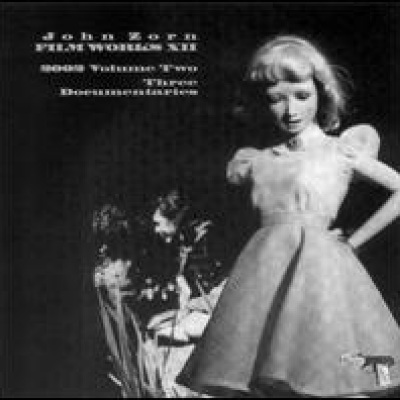
Film Works, Vol. 12: Three Documentaries
by Thom JurekThe 12th volume in John Zorn's continuing soundtracks series is more varied than most. There are three film scores here, all of them written for documentaries, the only factor these works have in common. The music here is, not unexpectedly, all over the map, but Zorn's focus is not; he is a keen student of the image, and listening to the way he crafts his music for the movies is more than a little revealing of his intensely methodological approach to seeing both the image as it unfolds and the music itself as it tends carefully to the projected frame. The first is one of Zorn's most precisely realized pieces and one of his most ambitiously varied. Written for Charles Dennis' Homecoming, a tribute documentary about the dance program at PS 122 in New York, Zorn set out to craft a series of musical environments centered on the form of dancing. From funky soul-jazz grooves to Latin meringues to nearly classically sculpted chamber environments, Zorn and his ensemble -- including vocalist Jennifer Charles, violinist Mark Feldman, pianist Jamie Saft, and Zorn himself on organ, Wurlitzer piano, and glass harmonica -- play these pieces with a kind of mischievous glee, given that this movie has the word "celebrating" in its subtitle. This is tribute music of the most glorious and unpretentious kind, with vanguard scalar studies slipping off formal jazz structures and loopy cartoon rhumbas grinding against minimalist (yes, minimalist) tonal and timbral studies. On the score for Shaolin Ulysses, a film by Mei-Juin Chen and Martha Burr that details the struggles of the Shaolin monks living and training in the United States, Zorn employs the talents of guitarist Marc Ribot and Chinese master pipa player Min Xiao-Fen along with percussionists Cyro Baptista and Roberto Rodriguez with bassist Trevor Dunn. Given his feelings about the film, which evoked a strong reaction about all of its conflicting surfaces, Zorn uses musical diversity once again in his score. There is a distinct Ennio Morricone feel to much of the music here, and given the subject matter it is completely understandable. Finally, in the score for Family Found, Emily Harris' portrait of the true outsider artist Morton Bartlett, only Erik Friedlander's cello and Jennifer Charles' voice are used. Given Bartlett's tender and somewhat disturbing subject matter -- he had no family so he created one out of half-life-sized dolls he made, along with their wardrobes and surroundings -- the score fits the subject. Charles' wordless vocals -- purring, sometimes moaning in pain and loneliness or just whimpering with Friedlander's mysteriously layered cello -- playing against the empty space is both haunting and daunting and devastatingly provocative in its simply and ghostly beauty. Zorn's Film Works volumes keep on coming, with each one being more complex, asking more questions, and composed more beautifully than the last. This is among the finest recordings of his music ever released.
